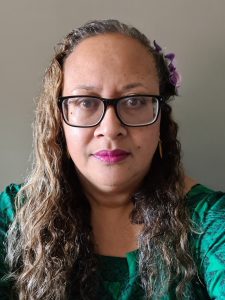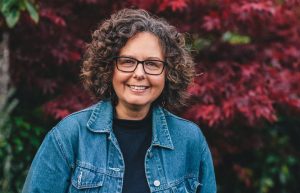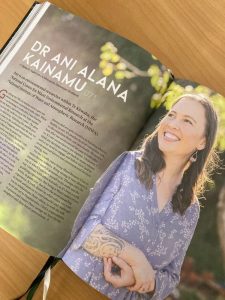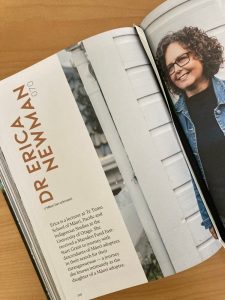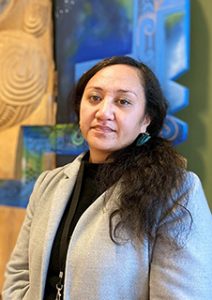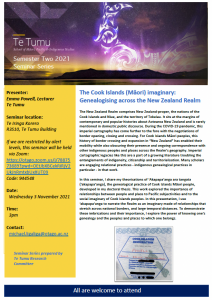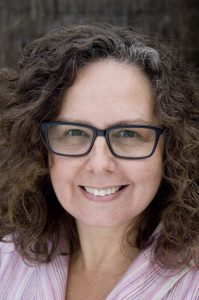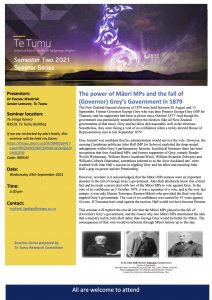COVID-19 Talanoa: the South Canterbury Tongan community
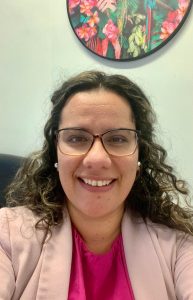 Last week, Pauline-Jean Luyten (Tongan, Dutch) walked across the graduation stage to be “capped” for completing her Master of Indigenous Studies degree.
Last week, Pauline-Jean Luyten (Tongan, Dutch) walked across the graduation stage to be “capped” for completing her Master of Indigenous Studies degree.
Pauline is a Timaru-based lawyer. She conducted her MIndS research on a local topic, but one that touches everyone across the globe: “COVID-19 Talanoa: The Voices of Tongan Kāinga in South Canterbury”. Dr Telesia Kalavite, of our Pacific Islands Studies programme supervised this research.
Abstract: This research is an exploratory study on the experiences of Tongan kāinga (distant relations/community) in the rural region of South Canterbury, New Zealand before and during the COVID-19 pandemic. It examines Tongan kāinga’s migration stories and their experiences in response to COVID-19 from March 2020 to May 2020. Migration stories were gathered to provide background and context for Tongan kāinga’s diverse responses during COVID-19 and to acknowledge participants’ journey to the diaspora. A further aim was to challenge the deficit theory paradigm often ascribed to Pacific ethnic-specific populations by demonstrating the richness and strength of Tongan cultural values, knowledge, and customs. The Kakala methodology comprised individual talanoa with nine participants based in South Canterbury. Findings showed that kāinga Tonga in South Canterbury derived strength from their children, family, and faith to persevere and support each other throughout the COVID-19 pandemic. Hardships were navigated through care and concern for others, gathering and processing information, and collective activation and mobility.
Findings also revealed that participants negotiated between Tongan and Western values in the predominantly New Zealand European ethnic region. They do this as individuals, and as kāinga through the Tongan Society South Canterbury. Local community-based solutions and cross-cultural provider collaboration, irrespective of ethnicity, was strong and effective in South Canterbury with selective organisations. Participants reflected and demonstrated that Tākanga ‘Emau Fohe (together we can make a difference) contributed to overcoming hardships during COVID-19. This is the first piece of academic research on the experiences of Tongan kāinga in South Canterbury, or any comparatively small Tongan or Pacific ethnic-specific community in New Zealand. Further research is warranted.
Future plans: We asked Pauline what her future plans might be. She replied, “I intend to undertake PhD study and conduct further research on Tongan kāinga in the provincial regions in the South Island or isolated areas in Aotearoa New Zealand. Being NZ born with both Tongan and Dutch heritage, I have an interest in exploring the praxis of engagement between cultures, identity and belonging. Most importantly, to identify practical ways for our respective cultures to understand each other, substantiated in community-based solutions and research. I aim to utilise the knowledge and skills derived from my thesis to assist with cultural awareness and education described in a way that is understood by mainstream resident population whilst ensuring maintenance of Tongan values. Contemporaneously, I endeavour to be and support our kāinga to be at the decision-making table to ensure equity of input, equity of access and equity of outcome and challenge the deficit theory paradigm. This way we can carry our ancestors’ values and leave a legacy for our fānau (children)”
Fakamālō atu, Pauline. We wish you all the best with your future studies.
New opportunity for Dr Michelle Schaaf
Being an academic at a university is not just about teaching and research. It’s also about leadership and capacity building. This post looks at new opportunity for Dr Michelle Schaaf of our Pacific Islands Studies programme to develop these skills.
Te Manahua New Zealand Universities Women in Leadership Programme (NZUWiL) is an initiative for the New Zealand tertiary education sector funded by Universities New Zealand – Te Pōkai Tara. This programme aims to recognise and enhance women’s leadership capacities and influence within universities. It provides opportunities for participants to examine leadership approaches and strategies; increase understanding of the tertiary education sector, research management, leadership capability, diverse learning environments that builds on the diversity of experience within the group, personal and national networks, active communication and change management techniques.
Michelle is the current Humanities Associate Dean Pacific and a senior lecturer in Te Tumu. At the end of March, she received confirmation that she was the recipient of the Te Manahua NZUWiL Pasifika Women Scholarship and a successful University of Otago nominee selected to attend the 2022 Te Manahua New Zealand University Women in Leadership: Academic Programme.
While Michelle has held numerous leadership roles, she strongly believes that there is always the space and need to upskill to ensure that one does not become a complacent leader. She grasped the opportunity to apply for Te Manahua NZUWiL Programme and the Pasifika Women Scholarship, as vehicle through which she could learn how to become a more effective leader who responds to challenges in a timely and respectful manner. On completion of this programme, Michelle proposes to reciprocate the University of Otago’s nomination, through the transfer of this new basket of knowledge and skills to capacity build and mentor staff.
New Book on Indigenous Research
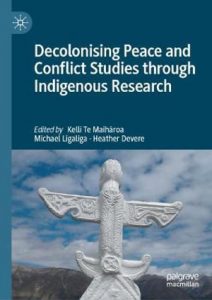 Decolonising Peace and Conflict Studies through Indigenous Research is a new edited collection, published by Palgrave Macmillan, with several Te Tumu connections.
Decolonising Peace and Conflict Studies through Indigenous Research is a new edited collection, published by Palgrave Macmillan, with several Te Tumu connections.
One of the editors, Dr Kelli Te Maihāroa graduated from te Tumu with her PhD on Māori peace traditions in 2020; and Vaivaimalemalo Dr Michael Ligaliga was until recently a member of Te Tumu staff. The third editor, Dr Heather Devere, who recently retired from the National Centre for Peace and Conflict Studies, was also well known to many Te Tumu staff.
The book is made up of three main sections: Indigenous Epistemologies, Methodology and Method; Peace Education and Indigenous Research; and Indigenous Perspectives on Peace Development and Peace Processes, with a global array of contributing authors. For the contents list, and download options, click here.
Congratulations to Kelli, Michael and Heather for this exciting new book.
Dunedin Cook Islands Research
It’s always great when undergraduate students get an opportunity to undertake research. This summer, Dr Emma Powell of Indigenous Studies had two young students helping with her look at the history and experiences of Cook Islanders in Dunedin as part of the ‘Akapapa’anga nо̄ te iti tangata project.
The following is an account from one of the students, Tiare Makanesi.
At the beginning of 2022, Emma Samuels and I had the privilege of working alongside Emma Powell on ‘Akapapa’anga nо̄ te iti tangata: Stories from the Cook Islands Community in Dunedin. With this project, we learnt more about the Cook Islands community in Dunedin and the journeys of our community from the Cook Islands to New Zealand. From finding Cook Islands dance troupes in the early 60s to learning about the Uki Tamariki Ou Cook Islands childcare centre that was set up in the early 2000s in Corstorphine, we gained a better understanding of our culture and how significant it is to the culture of Dunedin.

Anja Matapo, with the research students for the ‘Akapapa‘anga nō te iti tangata project, Emma Samuels and Tiare Makanesi.
We spent most of our time scouring through an array of archives to create a foundation of knowledge to prepare us for our on-going community work. The Hocken was our most used archive where, with past papers and microfilm, we discovered many stories that captured beautiful Cook Islands values and parts of our culture.
One article that I believe expresses the importance of our ui tupuna (ancestors) was an ODT piece from 1993. Emma’s pāpā (grandfather) was interviewed during a study about why the majority of rest home residents are European. Pāpā Puka attributed living with his children as a common tradition practised throughout Polynesia. This custom shows how we treasure and continue learning from their puna (springs) of knowledge. We look after them as they did us. This article reminded us of how important it is to respect and care for those that raised us.
Another article that we came across was about a community leader, Pāpā Kōpu Rouvi, and his involvement within the Dunedin Cook Islands community since 1966! Papa Kopu served the community when bringing Cook Islanders from the Islands to Dunedin, supporting those that needed advice. He became a role model that recently arrived Cook Islanders could confide in. This year was the second year anniversary of his passing and Emma and I organised a gift for his family on behalf of the Otago University Cook Islands Students’ Association. The support and guidance he gave University students over the years was irreplaceable and we wanted to show our appreciation.
Emma’s part in this project has included project managing the Cook Islands’ community’s (Te Vaka Cook Islands of Dunedin Inc.) oral history project, funded by the Ministry of Culture and Heritage. Her time has been spent upskilling and organising so that the community can complete this project to deadlines and to the standards expected by the funder. Thoughtful communication, the importance of a plan B and taking that extra step for refinement are all things Emma has learnt and put into practice. Emma said this project was more than just researching for her. It was a special insight into a community that she loved being a part of. She has focused on organising an oral history workshop for the community with oral historian, Helen Frizzell, and others at the National Library, and she created an adjusted budget and plan for the project following the award in late 2021.
For Emma and I, it has been an extremely rewarding experience to delve deep into the histories of our Cook Islands community here in Dunedin. Although we are Dunedin-born and raised, we hadn’t grown up involved in Cook Islands events. This project has helped us reconnect with our culture in so many ways. We now have a wealth of knowledge and a kete (basket) of ideas to continue enriching the community through the Otago Cook Islands Students’ Association. The difficulty of uncovering this knowledge also inspired us to amend our association’s constitution to donate to the ephemera collection at the Hocken Archives every year. This will be a growing legacy of our footprints as Cook Islands students here at Otago University.
Emma and I are thankful for this opportunity to dig through the archives as we never would have without encouragement. We were rewarded with evidence of sports teams, church functions and cultural programmes throughout the archive. Not only was I fortunate enough to learn about my cultural heritage but also my family’s history. I am now more aware of my language, culture and how my grandparents experienced life when they arrived here. That was my favourite part of this project. It has allowed us to build strong connections within the community which is important when finding our identity. It really has helped us discover what it truly means to be a Cook Islander here in Dunedin.
We have the deepest gratitude for Te Vaka and Emma Powell for putting their faith in us to execute this research. We have gained many skills and experiences during our work and appreciate the responsibility given to us. We would like to thank Te Tumu and the University of Otago for allowing us to take a break from our supermarket jobs and fully immerse ourselves in such a rewarding “job”.
Meitaki ma’ata,
Tiare Makanesi.
Erica’s research is in the news again!
It’s always great when Te Tumu research gets disseminated to more public audiences. In the last few days, Erica Newman‘s research on the children of Māori who were adopted into non-Māori families has made it into the Otago Daily Times, and Kim Hill’s Saturday Morning programme on Radio New Zealand.
Click here for the ODT article, and on the bar below to listen to the RNZ mp3 file.
Te Tumu featuring in a new book on Indigenous Women
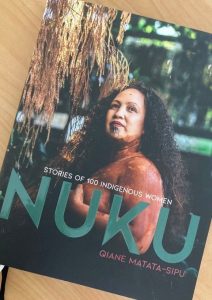 A new book, Nuku: Stories of 100 Indigenous Women, written by Qiane Matata-Sipu has just been publishing containing (as the title suggests) stories from 100 indigeneous wāhine, mainly wāhine Māori.
A new book, Nuku: Stories of 100 Indigenous Women, written by Qiane Matata-Sipu has just been publishing containing (as the title suggests) stories from 100 indigeneous wāhine, mainly wāhine Māori.
“These women and their stories dare to carve their own unique portrait, showing that the world can be positively shaped by our diverse and connected Indigenous voices. Stories about who we are, not who we’ve been told to be.” Qiane Matata-Sipu
Within this book Te Tumu has an alumna, Dr Ani Alana Kainamu, and current Lecturer, Dr Erica Newman. As with all narratives within this pukapuka, both Drs Kainamu and Newman talk about their own journeys within te ao Māori and what they are currently doing.
This book is well presented with fabulous stories from some amazing women.
If you are the type who prefers to listen rather than read, longer versions of each women’s kōrero are available as podcasts on https://nukuwomen.co.nz/nuku100/
Looking for a new Dean
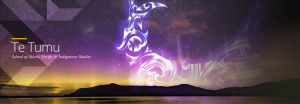 The university is advertising for a new Dean of Te Tumu, someone who is a great leader, researcher and person, with research and teaching aligning to Māori, Pacific, or Indigenous Studies (or a combination of these). CLICK HERE FOR LISTING.
The university is advertising for a new Dean of Te Tumu, someone who is a great leader, researcher and person, with research and teaching aligning to Māori, Pacific, or Indigenous Studies (or a combination of these). CLICK HERE FOR LISTING.
Please share this to your networks, and to anyone who you feel might be the right person for the job. Te Tumu is an exciting, dynamic school, at the best university in New Zealand.
The Cook Islands (Māori) Imaginary…
Dr Emma Powell is one of Te Tumu’s newest staff members, a member of our Indigenous Development team who will also be teaching INGS501 next year, the core paper for the Master of Indigenous Studies degree that investigates Indigenous methods and theories.
Emma will be presenting our next seminar, on “The Cook Islands (Māori) Imaginary: Genealogising across the New Zealand Realm” starting 3pm, 3 November. If we are back at Level 1, this will be in Te Tumu, otherwise click here to connect via Zoom. Code: 944548.
Please click on the poster below the abstract of Emma’s talk. Everyone is welcome to attend.
Just a few days to make a submission on adoption legislation
As you know Dr Erica Newman fronts a Marsden-funded research project, Journey Home: Descendants of Māori adoptees search for their tūrangawaewae. Read more about it here. She has recently been communicating with the Ministry of Justice as they begin to review the 1955 Adoption Act, providing her expert insight regarding the effect of this Act on the identity of Māori adoptees and their descendants, especially if they have not been able to connect to their taha Māori.
Erica writes, “New Zealand’s 1955 Adoption Law has had a detrimental affect on the identity of many adoptees and their descendants. This antiquated piece of legislation is now under review and this is our chance to have a say about what we think this new Act should look like, to a focus on the child rather than the adoptive and/or birth parents.
“For instance, this could be the repeal of the current Act altogether with the intention that a system be developed whereby a child’s identity is nurtured through continued connections with whānau and their history and culture, to allow the child to truly understand who they are through the knowledge of where they are from and where they belong. Or, alternatively, significant changes could be made to the current Act such as not renaming the child when adopted, not having a veto on records, a requirement to maintain whānau connections, and whāngai becoming legally recognised (under the recognition of the child’s hapū and iwi).
“If you have experienced the legal adoption system (personally or whānau members) this is an opportunity to have a say. The more narratives the Ministry of Justice has, the more informed they will be in making change.”
Below are links for more details, please note that submissions need to be in by 31 August 2021.
https://www.justice.govt.nz/justice-sector-policy/key-initiatives/adoption-law-reform/
Paerau Warbrick seminar, 28 September
Paerau Warbrick will be presenting on “The power of Māori MPs and the fall of (Governor) Grey’s Government in 1879” for the Te Tumu Seminar Series at 3pm Wednesday, 29 September. We may be lucky by then and be able to have the seminar in Te Iringa Kōrero, but if not Paerau will present a Zoom seminar.
There are many interesting stories relating to Māori parliamentary politics and elections, about which Paerau is an expert. His interests in this area span from 1868 when the first Māori members sat in the House right up to the present day; with this seminar looking at the Māori contribution to the fall of the Grey Ministry in 1879. Click on the poster for the full abstract.
Click here for the Zoom connection. The code, if needed, is 969542.
Te Tumu seminars are open to all interested people; please feel free to attend and to share this post.

